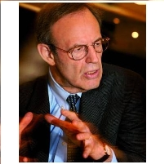The NED provides grants to media outlets, human-rights groups and other organizations for the stated purpose of fostering democracy in foreign countries.
Despite its status as a nongovernmental agency, the NED receives the vast majority of its funding from congressional appropriations. Each year, the agency issues several hundred grants averaging about $50,000. By far the largest recipients of grants are the American Center for International Labor Solidarity, the National Democratic Institute for International Affairs, the International Republican Institute and the Center for International Private Enterprise, who in turn disperse money to smaller groups. The divergent ideological underpinnings of these four organizations - for example, the ACILS is affiliated with the AFL-CIO, while the CIPE is pro-business - are meant to demonstrate the nonpartisan nature of the NED’s support. In addition, figures from various ideological backgrounds serve as NED officers and directors, including former U.S. Rep. Dick Gephardt, political scientist Francis Fukuyama and U.S. Sen. Norm Coleman, among others.
Remarks by President George W. Bush to the National Endowment for Democracy on Oct. 6, 2005
U.S. Bankrolling Is Under Scrutiny for Ties to Chávez Ouster
(by Christopher Marquis, New York Times)
National Endowment for Democracy: Paying to Make Enemies of America
(by Ron Paul, Antiwar)
- Table of Contents
- Overview
- History
- What it Does
- Where Does the Money Go
- Controversies
- Suggested Reforms
- Comments
- Leave a comment

Carl Gershman was born in New York City on July 20, 1943. He received a bachelor’s degree from Yale University in 1965, followed by a master’s degree from Harvard Graduate School of Education in 1968. Gershman has had a long and varied political career. Prior to assuming the presidency iof the National Endowment for Democracyn 1984, he worked as director of research, co-chairman and then executive director of the Youth Committee for Peace and Democracy in the Middle East between 1969 and 1974; as chairman of the Young People’s Socialist League between 1970 and 1974; and as executive director of Social Democrats, USA, between 1975 and 1980. He then served as a resident scholar at Freedom House from 1980 to 1981, as well as a human-rights representative to the United Nations under U.S. Ambassador Jeane Kirkpatrick.
- Latest News
- D.C. Public Schools will Teach all Second-Graders to Ride a Bike
- New Rule in Germany Limits Sales of Sex-Themed E-Books to 10pm to 6am
- What Happened to the 6-Year-Old Tibetan Boy the Chinese Government Kidnapped 20 Years Ago?
- U.S. Ambassador to Turkey Photoshops his Hair Color to Mock Turkish Mayor
- Mystery Artist Calls Attention to Unfixed Potholes by Drawing Penises around Them
The NED provides grants to media outlets, human-rights groups and other organizations for the stated purpose of fostering democracy in foreign countries.
Despite its status as a nongovernmental agency, the NED receives the vast majority of its funding from congressional appropriations. Each year, the agency issues several hundred grants averaging about $50,000. By far the largest recipients of grants are the American Center for International Labor Solidarity, the National Democratic Institute for International Affairs, the International Republican Institute and the Center for International Private Enterprise, who in turn disperse money to smaller groups. The divergent ideological underpinnings of these four organizations - for example, the ACILS is affiliated with the AFL-CIO, while the CIPE is pro-business - are meant to demonstrate the nonpartisan nature of the NED’s support. In addition, figures from various ideological backgrounds serve as NED officers and directors, including former U.S. Rep. Dick Gephardt, political scientist Francis Fukuyama and U.S. Sen. Norm Coleman, among others.
Remarks by President George W. Bush to the National Endowment for Democracy on Oct. 6, 2005
U.S. Bankrolling Is Under Scrutiny for Ties to Chávez Ouster
(by Christopher Marquis, New York Times)
National Endowment for Democracy: Paying to Make Enemies of America
(by Ron Paul, Antiwar)
Comments

Carl Gershman was born in New York City on July 20, 1943. He received a bachelor’s degree from Yale University in 1965, followed by a master’s degree from Harvard Graduate School of Education in 1968. Gershman has had a long and varied political career. Prior to assuming the presidency iof the National Endowment for Democracyn 1984, he worked as director of research, co-chairman and then executive director of the Youth Committee for Peace and Democracy in the Middle East between 1969 and 1974; as chairman of the Young People’s Socialist League between 1970 and 1974; and as executive director of Social Democrats, USA, between 1975 and 1980. He then served as a resident scholar at Freedom House from 1980 to 1981, as well as a human-rights representative to the United Nations under U.S. Ambassador Jeane Kirkpatrick.
- Latest News
- D.C. Public Schools will Teach all Second-Graders to Ride a Bike
- New Rule in Germany Limits Sales of Sex-Themed E-Books to 10pm to 6am
- What Happened to the 6-Year-Old Tibetan Boy the Chinese Government Kidnapped 20 Years Ago?
- U.S. Ambassador to Turkey Photoshops his Hair Color to Mock Turkish Mayor
- Mystery Artist Calls Attention to Unfixed Potholes by Drawing Penises around Them






Comments